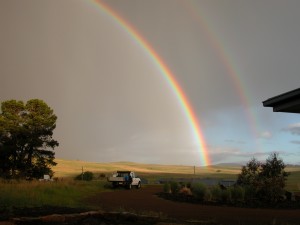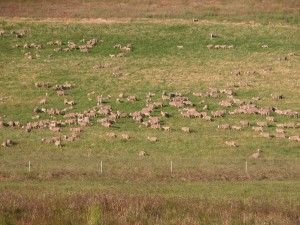When I first began farming, after I realised that it was not going to be as easy as it looked from the highway, I would ask “Why?” about any number of mysteries having to do with raising sheep. Almost invariably, the answer would come back in some variation of: “It’s the season.” Why is the spear grass so bad this year? It’s the wet spring. Why are the grubs so bad this year? It’s the dry winter. Why are we having so much trouble with intestinal worms? It’s the wet summer.
To someone of my control-freak persuasion, these answers weren’t just unsatisfactory, they were infuriating. How could I possibly fix things if the reason they were broken was something I had no control over? Bother the season!
Then at a wonderful field day, ecologist Judy Earle said the magic words: “The only thing as a farmer that you can’t control is the weather. All the other variables are yours to determine. It’s in your hands.” Ah, I thought, this is more like! I can do this.
So I set about identifying, managing, and attempting to control every blessed variable I could think of. I asked scientists as well as other producers “Why?” and I got far more explicit answers. I took those and worked even harder at managing, and found more questions to ask.
Until one day I realised that each of those lovely explicit answers only represented the view of a single “expert” in a particular area. And the collection of explicit answers was rife with internal inconsistencies. So, I went looking for the integration expert who could help me resolve the contradictions.
And that’s where my house of cards finally collapsed. There is no “expert” who can do that job for me. I’m it. And woefully unprepared was I to accept that the deeper truth is that it is indeed the season, though not quite in the way that you might think.
A farm is an amazing, dynamic, unpredictable, genuinely complex system. Complex in this context means more than just complicated. It means that the system contains so many interacting individuals, and so many environmental variables, that new behaviours of the system can, and will, emerge at any time. And the past history of all of those variables will also play into the detailed way the system responds to the season.
So, it is the season, silly. My farm will be a different place to manage from moment to moment because of the complexity inherent in its structure and denizens (including me!) and the complexity of the forces that drive it.
This year my exotic pastures are characterised by lots more introduced annual grasses than I would like. The annual grasses annoy me because they can get into the wool, so I’m limited in where I graze the sheep once the seed heads harden off. Mostly, though, they annoy me because they look bad. They are the C-minus on the report card that says, Nancy overgrazed those bits last season, the dry winter didn’t help, nor did the grubs, and so here they are, the tell-tale spear grass and barley grass. Right in front of God and everybody.
So, rather than fight this “invasion” what should I do? I don’t really know, I’m still experimenting. I’ve switched my rotation pattern back to front, to get the sheep grazing the annual grass areas before the seed heads harden. I’m resisting the impulse to mow everything in sight. I’m trying to sort out how to avoid grazing those areas again until winter, when the seed heads have fallen. And I’m trying to find genuine admiration for the capacity of annual grasses to grow like crazy when the seasonal conditions are right.
But when I stand back a bit, and look at the bigger picture, what I’m describing here is the definition of resilience in nature. Millions of years of adaptation and change have given our native ecosystems a huge line-up of players, each with its preferred conditions. That means that there is never a season without lots of diversity, although it won’t be the same mix as last year.
And healthy, intact native systems don’t get out of balance in the way that species-poor “improved” systems can—like my spear grass abundance. In a healthy natural ecosystem, there will always be a host of plants waiting to step in and take advantage of the season, and compete with other plants doing the same thing.
This year I’ve found native plants I’ve never seen here before, including a damp-loving bush pea, and a drought-tolerant dwarf mat-rush. And I’ve just found kangaroo grass in the Park for the first time. It could be, of course, that I missed it, or the sheep ate it before I saw it, or… maybe it is just the season.
And speaking of seasons, I hope your holiday season is filled with love, kindness and lots of good cheer. I look forward to hearing from you in 2014.
p.s. for my northern hemisphere readers, this time of year is referred to here as the silly season, a confluence of Christmas and summer holidays that means almost no serious work gets done between about now and the end of January.











